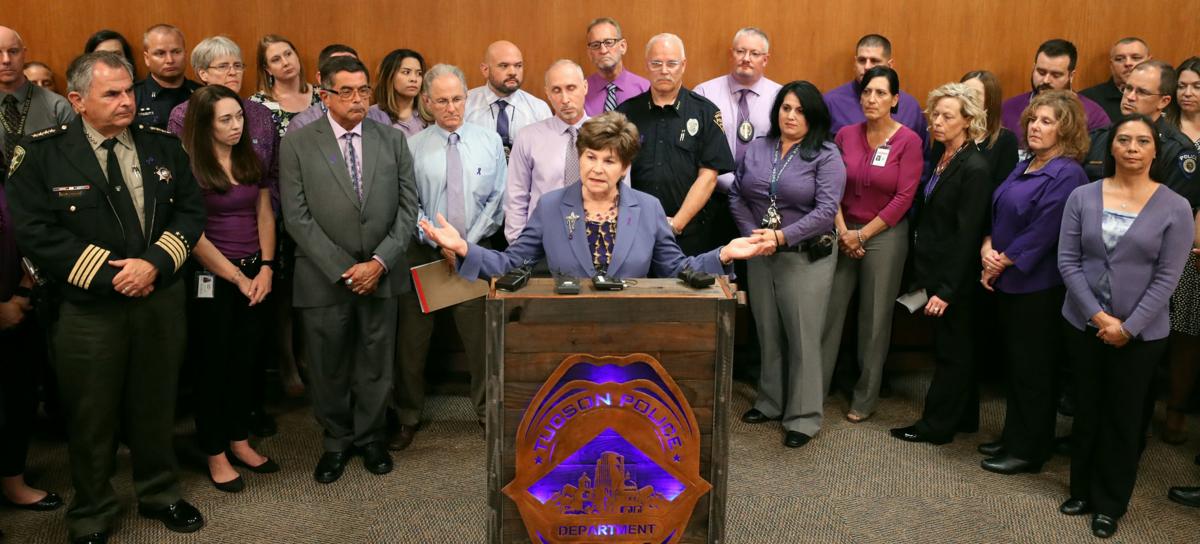Dozens of representatives from local criminal justice agencies gathered Tuesday to address the “persistent and pervasive” issue of domestic violence and urged the public to stop thinking about intimate partner violence as a private matter.
Each year, Tucson police officers and Pima County sheriff’s deputies respond to roughly 15,000 domestic violence-related calls, with 46 domestic violence-related deaths having taken place this year in Pima County as of May 19.
Between July 1, 2018, and June 30, 2019, about 6,000 victims sought services through Emerge Center Against Domestic Violence, nearly 2,000 of whom were identified through a countywide risk assessment protocol that was rolled out 18 months ago.
“The sheer volume should be enough to give us great pause to think about what we are and are not doing,” Emerge CEO Ed Mercurio-Sakwa said Tuesday.
Emerge is part of a countywide network and works closely with Southern Arizona law enforcement agencies, the Pima County Attorney’s Office, and various other community and faith-based groups to address needs of survivors, family members and perpetrators of domestic violence.
The collaboration is rare, said Tucson Police Chief Chris Magnus, adding that along with community education, conversations surrounding domestic violence and acceptable behavior in relationships also need to occur.
“We have to have these conversations with children at a very young age,” Magnus said.
While the collaboration and use of the risk assessment tool is unusual, Tucson’s domestic violence problem is not, according to Magnus, who said he has had decades of involvement in gatherings like Tuesday’s and that domestic violence continues to be a “massive challenge.”
Magnus highlighted the value of grants sought in recent years by the Tucson Police Department and other agencies to assist in efforts to meet the community’s needs.
TPD received a federal grant from the Office of Violence Against Women to fund the jobs of two Spanish-speaking detectives to help address an underserved population.
Pima County Attorney Barbara LaWall’s office has received $1.2 million in grant funding over the last three years, which has helped fund various endeavors, including last year’s roll-out of the Arizona intimate Partner Risk Assessment Instrument System, also called the APRAIS protocol.
Most recently, Pima County’s Risk Assessment Management and Prevention Coalition, of which LaWall’s office is a part, received a $220,000 grant in July to help fund victim advocates, shelter and training on strangulation detection and forensic strangulation examinations, which can be instrumental in obtaining a conviction.
LaWall said she has implemented multiple strategies during her time in office to address domestic violence issues, including the development of a specialty court with a multidisciplinary approach to ensure that the most violent and repeat offenders don’t slip through the cracks.
LaWall’s office works closely with other agencies to help provide services for victims and is part of a new group, the Justice League Task Force, which was formed to identify areas of needed improvement surrounding domestic violence.
“We’ll never be able to arrest and prosecute our way out of domestic violence,” LaWall said, adding that society needs a change in mindset when it comes to education, information and prevention surrounding domestic violence.
Pima County Supervisor Richard Elías called domestic violence a public health issue, sharing the story of his mother, Viola, a survivor of domestic violence.
Elías said he believes people need to talk about domestic violence and work with survivors on their journey back to becoming whole.
Tucson Mayor Jonathan Rothschild said domestic violence is persistent and pervasive but also complicated, as every story is different.
“Its roots lie in entitlement,” Rothschild said, adding that once the pattern starts it is easy to recognize.
Mercurio-Sakwa said it’s important to remember that there are humans behind the statistics.
“They’re our family members, friends, neighbors, coworkers. They’re people. Our people. Our community,” Mercurio-Sakwa said. “This is not a private matter.”





